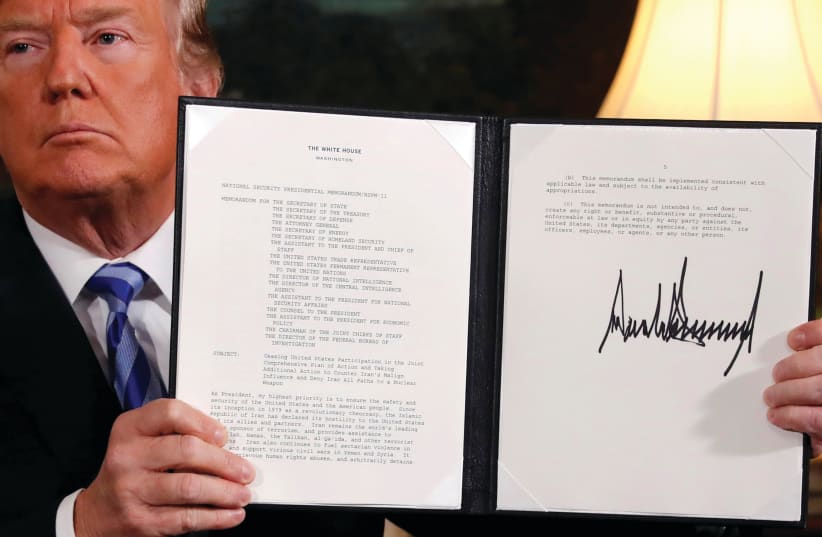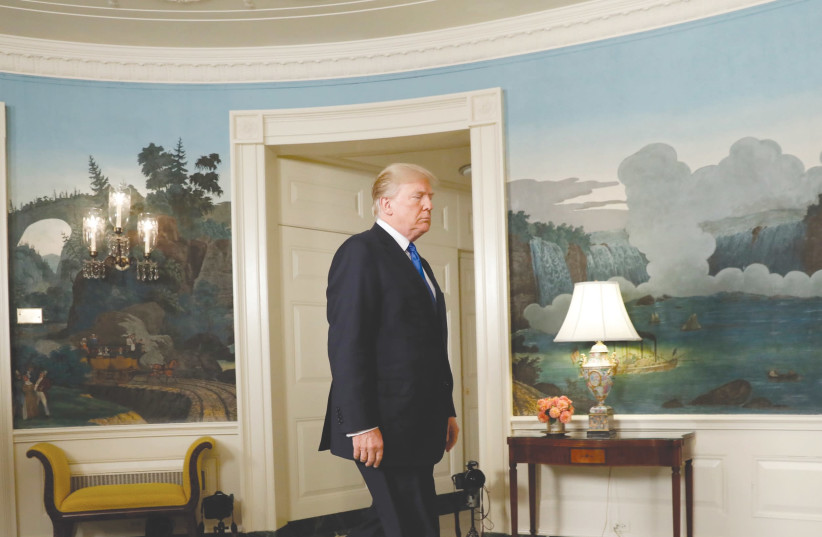Candidate Ronald Reagan in 1980 famously asked, “Are you better off today than you were four years ago?” Updating that question, one might ask, “Are you safer from an Iranian nuclear threat than you were four years ago?”
Actually, it was about three and a half years ago when then-President Donald Trump tore up the Iranian nuclear agreement, calling it “the worst deal ever” and saying he could do much better by applying “maximum pressure.” He immediately reimposed old sanctions, added a few of his own and heavy servings of threats, bluster and bluff.
Did Trump overplay his hand, or did he not intend to play it at all? Given that he never made a serious – or actually any – effort to negotiate a better deal, it is fair to assume it wasn’t the Iranian pact he wanted to shred so much as his predecessor’s legacy.
Trump left a path of collateral damage, starting with what remained of American credibility. Why would any country agree to negotiate with the United States if the next president would just scrap any agreement on a whim? Sanctions did not produce the economic deterioration that would force the Islamic Republic to curtail support for terrorism and regional unrest nor halt Tehran’s missile and nuclear programs. If anything, Iran’s bad behavior has only accelerated.
Trump had been pressed hard by former prime minister Benjamin Netanyahu to abrogate the treaty but neither leader had any serious interest in improving it, just killing it. They seemed driven by their shared animus toward president Barack Obama.
Former Mossad chief Efraim Halevy has said Netanyahu’s Iran policy and his pressure on Trump was a “grave mistake” that led to a “dismal failure.” The result was to push Iran closer to the bomb, not away, he added. The JCPOA (Joint Comprehensive Plan of Action) may have been flawed, but was preferable to no agreement, he said.
Prime Minister Naftali Bennett, who initially opposed the Iran deal, has said his predecessor’s bitter, public opposition strained relations between Israel and American Jewry and the Democratic Party, and that he intends to repair that damage and keep disagreements private. As a result of Netanyahu’s role in the US withdrawal from the JCPOA, Iran has made a “great jump forward,” he has reportedly told colleagues.
Joe Biden ran for president promising to rejoin the nuclear pact, but that is proving far more elusive than he expected. Maybe even impossible. He has been under pressure from the Left and Right not to return to the status quo ante and to go for restrictions on Tehran’s ballistic missile capabilities and its support for terrorism and destabilizing proxies as well.
Iran elected an even more extreme government in June. Ebrahim Raisi, Iran’s arch-conservative, anti-American president, is reluctant to return to the talks, perhaps because he believes Biden is too anxious and the longer the stall the sweeter the deal. Raisi remains under US sanctions imposed two years ago, when he was head of the judiciary, for human rights violations. His new chief negotiator, Ali Bagheri Kani, is said to be rabidly anti-Western and a staunch opponent of the pact.
Iran walked out of negotiations in Vienna over reviving JCPOA in June and has shown little interest in returning. The intelligence minister said the regime might abandon its pledge to never build a nuclear weapon unless sanctions are lifted. The foreign ministry said it would meet with EU representatives in Brussels this week only to discuss terms for returning to the Vienna talks, but France24 news site said nothing is planned.
ISRAELI OFFICIALS suspect Iran has been dragging its feet on getting back to the table in order to buy time to grow its stockpile of enriched uranium. Tehran is playing a waiting game, expecting that Biden will blink first. Sanctions may be causing great pain, particularly on the streets, but being a religious autocracy largely frees the regime from worrying about public opinion.
Washington, its European allies and Jerusalem may or may not be talking about a “Plan B” in the event there is no JCPOA revival. Different players have different takes on that, but it seems unlikely there is anything firm.
There appear to be no clear diplomatic options as Iran accelerates its nuclear and missile development. Nor is there a realistic military option that won’t risk massive retaliation by Iran and its proxies against Israeli and American interests throughout the region. Israel’s air and naval forces are far superior, but Iran, with its Hezbollah clients, has thousands of precision-guided warheads aimed at every part of Israel’s population, military bases, infrastructure and resources.
The United States just withdrew from its long, costly and losing conflict in Afghanistan and has no interest in another war in that part of the world. Over the past three administrations, America has been pivoting its focus from the Middle East to China. Secretary of State Antony Blinken told his Israeli counterpart, Yair Lapid, last week that “all options are on the table” if diplomacy fails.
Meanwhile, Israel continues to pursue its nonproliferation agenda by sabotage and assassination. That may not stop Iran’s nuclear program, but it can impede it. But the cost could be high in this most volatile of regions. So far Tehran has slow-walked increasing uranium enrichment, suggesting to experts it is in no rush to the nuclear threshold and is willing to wait for the right deal. For now.
Without an agreement, Iran could become the next North Korea, a rogue nuclear power that uses its weapons to blackmail its neighbors and protect the regime against any outside threats. Trump’s “maximum pressure” agenda turned out to be a “maximum failure.” As a result, Iran today is closer to nuclear breakout, has accelerated its missile development and expanded its disruptive role in the region.
It is time to develop a credible Plan B and publish it as a warning that Iran will take seriously.

